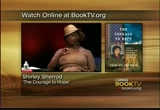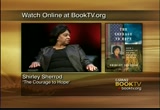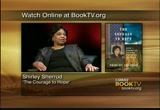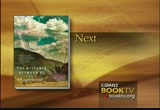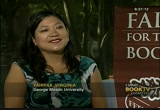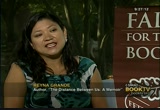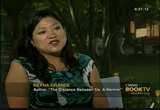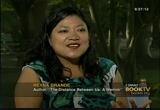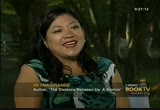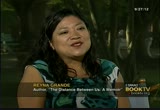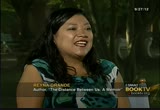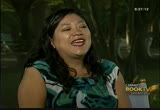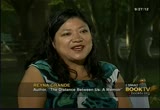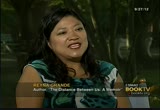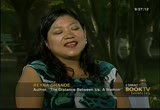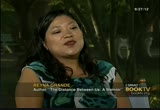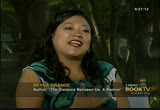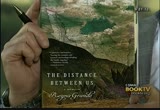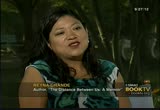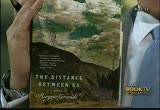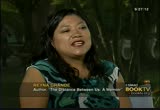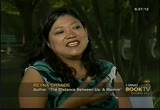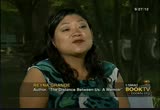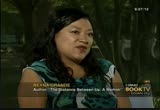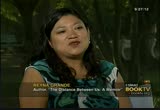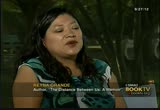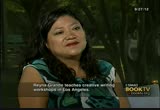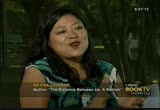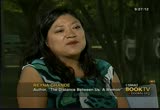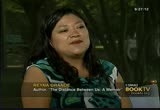tv Book TV CSPAN November 23, 2012 9:00am-9:30am EST
9:00 am
history has been. and that is brutal as the history of african-american struggle for humanity of life have been. there has been humanity and love and family and choice and possibility and sacrifice. so i wonder if you could go back. i know you were raised in the jim crow south, in baker county in georgia and you were a total daddies go. i know you're trying to get to drive the tractor four years old, streets and the neighbors. tell us about that. >> well, you know, we were in baker county, you hear about, you read about some of the sheriffs of earlier years, but the gator and the sheriff in our county wanted to be known as the gator. the gator actually ruled everything, everyone in the county. you can imagine looking at the
9:01 am
westerns from earlier days, anyone like him, but he was worse than what you see in your worst western. but growing up in that, my family lived, my great, great grandparents had come to baker county, i don't know whether they came as slaves or not, but i know they ended up there as sharecroppers, and with the intent on buying land. and that they did. they bought enough land that the area where i grew up is still today called hopkins down. and lots of families, but it was that way commute, the hawkins lived in one area. the williams and another, but we were all one big family, and felt we had to help each other. and so i was raised up on a farm, and my father, there were five girls, you know, any farmer wants a son. i guess any man wants a son, but
9:02 am
my mother and father kept having babies and they were all girls. now, we all have boys nicknames. i was bill. [laughter] spent your nickname is bill? that is hilarious. >> yes. but, you know, as we could be in the situation we're in, we felt safe and comfortable there. and i feel like my father, he wanted us to have an education. he knew that education was the key to a better life, but i really think he thought all of us would come right back home and tried to work from there. >> you can watch this and other programs online at booktv.org. spent in an interview conducted on the campus of george mason university in virginia during the fall of the book that'll come booktv talks to reyna grande about her memoir, "the distance between us." in the book she shares her experiences growing up in mexico without her parents, who
9:03 am
immigrated to the united states and legally defined work. this is about half an hour. >> reyna grande what is -- >> the way i grew up knowing was it was referenced to the united states. but to me because i grew up in this town surrounded by mountains, and i didn't know where the united states was, to me it was the other side of the mountains. and during that time that my parents were gone working here in the u.s., i would look at the mountains and think that my parents were over there, on the other side of those mounts to so that was it to me. >> where did you grow up? where we for? >> i was born in mexico, southern mexico in a little city that nobody has heard of. but when i mentioned, everybody knows a couple. it was three hours away from
9:04 am
acapulco. >> when did your parents come to the united states? how old were you? >> my father came there in 1977 when i was two years old. and he sent for my mother of two years later, so my mother came here in 1980 when i was four and a half years old. >> when did you come to the united states? >> i came to the united states in 1985 speed how old were you? >> in may of 1985. i was nine and a half, going on 10. >> what can you tell us about coming to the united states? what was your truck? >> well, i have been separate from my father for eight years, so when he returned to mexico in 85, my siblings and i convinced him to bring us back here because he wasn't going to come back to mexico. and we didn't want to spend any more time separated from him. so we begged him to bring is your, and my father did really want to bring me because i was nine and a half and he thought it wouldn't be able to make it across the border because we have to run across illegally.
9:05 am
so i begged him to bring me here, and we took a bus from mexico city to tijuana, and -- >> right on the border. >> right, the border at tijuana, and it was a very long two day bus ride because i had rarely been in any kind of cars or any public transportation, and i got car sick many, many times along the way. but when they got to the border, my father hired a smuggler to bring us across. >> what your member of that experience? >> well, what i remember is how much walking there was pic and i remember having a lot of guilt because my father was right. i was too little to be making that kind of crossing, and i would get tired and complained about the walking and about the fact that i was thirsty or hungry and tired. and my father ended up getting the a lot of times on his back, and we got caught the first few
9:06 am
times by border patrols. and i just felt this and this guilt because i thought it was my fault that we had got caught. ending the third time -- >> what happens when you get caught, reyna grande? >> well, when we got caught we got loaded up into a van with everyone else who got caught, and then were taken to the border patrol offices. and i don't have a whole lot because we were children, you know, we weren't really like talk to by border patrol. they would take my father into an office to talk to him. and i were remember just waiting for him in the hallway, and the border patrol people were very nice to us, and i remember they offered to get us a soda. so their broadest sodas and we were drinking our soda, waking for our debt. so it was -- waiting for a dead. we were treated very kindly by the border patrol but at the same time, knowing that they were keeping us from crossing
9:07 am
and funding able to have a chance at having our father back in our lives. >> reyna grande, the third time. >> the third time we crossed the border was very scary because my father decided to try in the dead of night, hoping that the darkness would protect us and help us across. and he was right. it was pitch black. we couldn't even see where we're going, and a lot of times we were, like tripping on rocks and stumbling. and then what our number most about the border crossing was a helicopter. and there was a helicopter they came back with a searchlight and we were just running for our lives trying to find a place to hide, and we crawled under the bushes it and i remember that the beam of the light fell on my shoe and i was praying so hard that the people up there in the cockpit had not seen me.
9:08 am
and luckily they didn't. so we made it across. >> where did you spend that first night? >> well, the first night, well, we may become by the time we made it across the border it was dawn. and we walked to the second house, and he was responsible for driving us to l.a. and he made us lie down in the back seat and he wouldn't let us sit up because he said we could still get pulled over by border patrol. so my siblings and i spent the whole car ride basically laying down, and it wasn't until we got like instead and when he said okay, you can get up now. and so, you know, just seeing all those things outside the window was so amazing, like i remember like on the palm trees. nmi hometown but it no palm trees. just the streets that never and and the buildings that seem to reach the sky.
9:09 am
it was just amazing. it was really amazing. >> where did you live in l.a. when you first got your? >> which i first got to l.a. i lived in highland park which is in northeast los angeles. and it was predominantly latino community. >> mostly illegal? >> i think it was a combination. yeah, there were a lot of immigrant families but, you know, there were also the legal and illegal families. >> how did the legals view the illegals? >> i'm not too sure about that, because as a child i don't think i was too aware of that kind of response from the adults. but what i do remember the most is being shocked to school that most of the kids in my classroom were dark skinned and they looked just like me and they had last names like garcia and
9:10 am
gonzález and they could speak in language i couldn't speak. and that was really shocking to me, because they looked, they looked exactly like me and yet they weren't. but i would say that was probably the first time i was really aware of the fact that there were latinos but they were different from me. >> you are in the ls classes? was that, was that a second class citizen type thing speak with yes. being a transfer student, that's who you are and that's way people treat you like an outsider. definitely there's a sense of separation because the kids that speak english, they hang out in their own circles, and then the esl kids would oftentimes just hang out by the classroom, near
9:11 am
the esl classroom. and i do remember, like, wanting to fit in but not being able to because i was an esl student but i worked very hard at trying to finish my esl classes and get out of that program. so by the time i was in eighth grade i was enrolled in regular eighth grade english. >> reyna grande, there's a picture we're going to show on the air now of view with a saxophone tell us that story. >> the saxophone was something i discovered when i was at burbank junior high school in seventh grade. my counselor involving in band. it wasn't something that i chose. they put me there. it was an elective, which i didn't elect, but i was so lucky to have been put in that class because when i walked in there and the teacher said, which instrument do you want to play, and at first i thought i had to
9:12 am
pay for them and i say, how much does it cost? and when he said it doesn't cost you anything. it just seemed like the whole world just opened up to me, and i can to choose whichever i wanted and i saw the saxophone and it was so beautiful, and that's the one i wanted. >> do you still played today? >> i don't play anymore, and i haven't played since i graduated from college because i never owned my own saxophone. when i went to you see, they didn't have marching band so i didn't have anything to join. and then i discovered a whole bunch of other things, you know, i got into dance, into film and video. i got into like all these other things that i was doing, and i really missed the saxophone and a wanted to get back into playing. and one of my teachers pulled inside one day, and she said you know, it's really good you're very creative and that you love
9:13 am
to explore and learn new things, but you need to choose one thing that you want to focus on because otherwise you're going to be a jack of all trades. and i went home that day and i thought, what is it that i cannot live without? and that's when i decided that writing was the one thing i couldn't live without. and i gave up everything else and i just focus on my writing. >> well, you are a novelist, an award-winning novelist, "across a hundred mountains" one an american book award in 2007. "dancing with butterflies" one an international like in a book award in 2010, and this is your first nonfiction, this memoir. this is is a very personal memoir. >> it is extremely personal. yes. that's the only way i know how to write, and even with my fiction, even though it is fiction, it's also inspired by
9:14 am
personal experiences, and with the memoir, you know, there were many times when i was afraid to go there because it was extremely personal. and i was and is writing about myself. i was writing about my family, about my parents, and there were many times when i felt that i was, i was writing things that i shouldn't. but then i felt that it was going to write a memoir, i needed to be completely honest with the story, and to turn my pain and my fear into my strength instead of him being my weaknesses. >> reyna grande, did you buy this book originally as english or in spanish? >> yes, i always write in english first. unfortunately, when i came to this country i got so obsessed with learning english that i neglected my native tongue. and for many, many years, all i did was eat and breathe the
9:15 am
english, to the point that when i got to college i was a writing tutor and i was tutoring native english speakers and teaching them how to write better english. but when i was in college i got exposed to spanish for spanish speakers, and that's when i took those classes and i said i'm going to reclaim my native tongue. but i write in english because it's so, it's so natural to me that i don't have to think about the language, the vocabulary as i'm writing. but when i've tried to write in spanish, i have to pick up the dictionary every single minute and i just completely pulls me out of the story because i have to think about the vocabulary. so as a compromise i write everything in english, and then i do my own translation. so i translated "across a hundred mountains" myself, and then "the distance between us"
9:16 am
will be published in spanish next year, and i did the translation also. >> do your novels sell well in spanish when? >> not as was the do in english but i think that's the case for most books that are published here in spanish, and that the spanish books don't have the same kind of selling aspect as english books. i think part of that is because people, the readers for spanish books can't afford to buy a book and they don't access to the books. especially in low income communities. there are no bookstores anywhere, and i think it's hard for them to really get access to the books. >> we are talking with reyna grande whose memoir is called "the distance between us: a memoir," published by simon & schuster. reyna grande, tell us the life
9:17 am
story. >> the life story? you mean the kerosene story? >> well, the life, you went to school and they did a sanitation check on you. spent all day, okay. yet, when i came to elementary and fifth grade, one day the nurse showed up and the teacher said she has come to inspect all the kids for lice. and i was so shocked because i could understand if that happened in new mexico -- in mexico because all of us had lice. we were all poor kids coming to school barefoot and dirty and we all had lice. but in l.a. i just didn't expect there to be lice. and for a second there i thought that maybe they had crossed the border illegally like i had, and yet, and i got inspected and it turned out that i had lice.
9:18 am
and i was so, i was so afraid to go home and tell that to my dad, because i didn't want him to think that i was still the dirty little girl he had left behind in mexico. and i thought he was going to beat me as well. because that was his favorite way of disciplining us. and it turned out that my father was not angry at me, and he didn't blame me, and he didn't beat me. and it was a beautiful moment because he took me out to the yard, and he looked for lice, and he cleaned out my hair and he spend like two hours looking through my hair, looking for lice, and he was so gentle when he did it that it was just like, like such a painfully beautiful moment for me. and then he was telling me stories about when i was a baby, but, of course, i didn't remember, but it was before he came to the u.s., before he left me in mexico, he told me that
9:19 am
every time he would come home for lunch during his break i would be waiting outside with a bowl, and i would tell him coming in, to give me a basket and i would like anybody base me except for him. so every day he would come and he would basically spent his whole lunch hour just give me a bath instead of eating. and he said that i wouldn't have it any other way. and when he told me that, like i just, i don't know. i thought it was such a beautiful moment that i got to share with him. >> reyna grande, that's one of the few in your book that is tender and beautiful about your father. >> yes, yes. my father was a very complicated man. you know, and he was suffering from alcoholism, and he was suffering i think from also a bad upbringing. his parents were very abusive towards him, and, unfortunately, he repeated the same cycle with us.
9:20 am
but as i was writing the memoir, even though i was writing about is very hard painful moments that i spend with him and suffering from a lot of abuse, i also got a chance to revisit all the happy memories. and one of the things that i hold most dear is that my father taught me to value education. and he was such a tyrant about it, and he often threatened to send me back to mexico if i didn't do well in school. >> was that a scary threat to? >> it was a scary threat because i really did believe him. i believe he would do it. >> you did not want to go back. >> yeah, i didn't want to go back. and i want to make them proud. and in another thing i felt was because i begged him to bring me, i felt that i owed him that. i felt that i never wanted my father to say, i shouldn't have brought you. and it was bad, but really, like
9:21 am
always motivate me to do really well in school, to do all these great things that he wanted me to do. because i didn't want to hear that ever from my dad. he never said that to me. he didn't. but yeah, i mean, my dad, as i was writing the book i really wanted to make sure that he didn't come across as the villain in the story. you know, i really wanted to give him his humanity. because he had some really great things, my dad, but he was also dealing with a lot of difficulties that unfortunately as i said our relationship spent and utilities were in it about how you want to go to church one sunday and he held up a budweiser and said this is my god. >> yes, yes. when did your father passed? >> he passed away last year, november. he died from liver cancer and he got diagnosed with cirrhosis back in 83 and he never told us.
9:22 am
and he kept drinking. and he actually gave up drinking in the late 90s but he gave up drinking, and he became very religious. he was a seven-day adventist. but he never got himself checked, and then a year and half ago when he went to the doctor, they told him he had liver cancer. and he really held onto the hope that he would get better, that he would get a transplant at some point, and he just every came out of the hospital. >> did his sobering up or change your relationship? >> not too much, because by the time he sobered up, things have gotten way too bad. and even though he had sobered up, he was still very distant. and he traded one obsession for another, you know. he went from being an alcoholic,
9:23 am
obsessed with our call to being this religious fanatic. and our member a lot of times that my siblings and i would invite him over to our family gatherings. he wouldn't come because he had to be at church, and he always had to be at church. and we always felt like we lose either way. he could be an alcoholic party could be religious and we're going to lose anyway because he will never make us his priority. and i remember when i got married, he was going to walk me down the aisle, and he was looking at the clock saying, what time is this wedding going to start? i have to go to my church. paris up. and i just felt so hurt because it's like i only get married once here. your churches there. it's always going to be there. but he kept like looking at his clock, and then when we were done with the ceremony he, like, took off right after that.
9:24 am
like he stayed for the reception, like for a little bit, but i felt so horrible the whole time thinking that i'm never going to be more important to my father than other things. and it really hurt me a lot. >> where does your mother figure into this? >> i have a lot of issues with my mom, and anybody who reads the memoir will know why. but my mother, she's still alive but she still in l.a. she lives about 20 minutes away from me, and it's been actually, now that i've become a writer and i have to travel a lot, i have to say that that has in a way helped me to have a better relationship with her, because she, like right now that i'm here, she's with my children, you know, and she comes over, she takes care of them. so she really tries to help me out whenever she can. and then also, it has really
9:25 am
helped me to understand her more, like having my own children. because i can understand now what it's like to be toward between being a mother and being a woman with her own dreams and aspirations. and every time i have to leave my house and my daughter asks me how long i'm going to be gone, i remember my mother and how i would ask her how long she was going to be gone, and i really do understand, you know, how hard it is to be torn into and to want to do right by your kids come and at the same time want to go off into the world to pursue your own dreams. so, i have a better relationship now with my mother, but definitely i mean, they're still an emotional distance, and i think there will always be an emotional distance. >> because sometimes your mother
9:26 am
would be gone for years? >> yes derek she came to the u.s. and you didn't even know what? >> right. and you know, my mother has not changed a whole lot. shia still like that in a way, you know, where she does things and we don't fit into the equation sometimes, and it's been a struggle to try to get her to be a little more motherly, but yes, i think i have accepted that's the way she is and we just take her as she is, and i think that it helps because then we are not disappointed. but i do hope that, yeah, that she could be a better grandmother. i know people change, i know my own, my good grandmother, my mother said she wasn't such a great mother to her, but to us she was a most wonderful grandmother in the world.
9:27 am
so i'm hoping that that's the way my children feel for her as well, that she's an awesome grandmother. and that's all, that's all, that's all i want, you do, for my kids to have a good relationship with her. >> reyna grande, azure mother been able to read this book or does she know what is in? >> she hasn't been able to read the book because it's in english. and my mother does not speak english. chino somewhat what's in it because i told her this is a story about my childhood and about my growing up in the u.s. and i write about you, i write about my dad. i don't think my mother really understands how, how i saw her as the daughter. and how her actions determined my childhood, you know, and now my childhood was really defined
9:28 am
by her absence but i don't think she understands that. so i am curious to see what she's going to say when the spanish version comes out. >> the distance between us, has anyone compared this, when i read i thought about frank mccourt's daughter. >> well, hector the rights the reviews for the "l.a. times," that's what he compared it to in his review. and i was just like beyond honored to be even in the same sentence as angela because that's such a wonderful book, and it's one of my favorite books. and for someone to say that my book is the angela of the mexican immigrant experience, i was just really thrilled. there are similarities, you know. i mean, we both talk about
9:29 am
poverty, about our relationships with our parents, with just struggling to overcome, you know, all the obstacles. and being able to go above and beyond what we thought we ever could. so there are many similarities, although i think, you know, one of the best things about angela is that there's so much humor that balances all that depressing stuff that she writes about, and i'm not very humorous, unfortunately. i would love to write more humor in my work, but i write from a very deep place that has mostly pain and sadness. and that's where my writing comes from. and i was thinking, and jenna, i s
74 Views
IN COLLECTIONS
CSPAN2 Television Archive
Television Archive  Television Archive News Search Service
Television Archive News Search Service 
Uploaded by TV Archive on

 Live Music Archive
Live Music Archive Librivox Free Audio
Librivox Free Audio Metropolitan Museum
Metropolitan Museum Cleveland Museum of Art
Cleveland Museum of Art Internet Arcade
Internet Arcade Console Living Room
Console Living Room Books to Borrow
Books to Borrow Open Library
Open Library TV News
TV News Understanding 9/11
Understanding 9/11